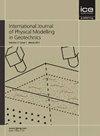Experimental and numerical studies of a strip footing on geosynthetic-reinforced sand
IF 1.2
4区 工程技术
Q4 ENGINEERING, GEOLOGICAL
International Journal of Physical Modelling in Geotechnics
Pub Date : 2020-09-14
DOI:10.1680/JPHMG.18.00021
引用次数: 8
Abstract
The behaviour of footings on geosynthetic-reinforced soils has been investigated by many researchers through experimental and numerical modelling under stress-controlled or strain-controlled conditions. It is believed that stress-controlled tests better represent the field conditions because the load applied to the footing increases as the super structure is being built. Therefore, a new experimental set-up was designed under a stress-controlled condition, with the application of particle image velocimetry (PIV) technique. A series of model footing tests were carried out using this equipment to investigate the behaviour of the geosynthetic-reinforced soil below a strip footing. The deformation inside the soil mass below the strip footing was determined using the PIV technique. The reinforcing performances of the single-layer and multi-layer geotextile and geogrid embedded at different depths were compared and discussed by analysing the load-settlement curves. The optimum embedment depth for the single-layer geosynthetic reinforcement is in the vicinity of 0.4B. It is found that there is a stepwise increase phenomenon in settlement under the stress-controlled condition. The ultimate bearing capacities were determined from the obtained stepwise load-settlement curves using three approaches, including the tangent intersection method, the tail linear method and the allowable settlement method. The three approaches were coded in a Python program in order to easily determine and compare the results. In addition, the experimental model footing tests were simulated using the finite element method (FEM) under the same stress-condition condition with good agreement for a settlement range within 0.1B.土工合成材料加筋砂土条形基础的试验与数值研究
许多研究者通过实验和数值模拟研究了土工合成加筋土地基在应力控制或应变控制条件下的行为。应力控制试验可以更好地反映现场情况,因为施加在基础上的荷载随着上部结构的建造而增加。为此,在应力控制条件下,采用粒子图像测速(PIV)技术设计了一种新的实验装置。利用该设备进行了一系列模型基础试验,以研究条形基础下的土工合成加筋土的行为。采用PIV技术对条形基础下土体内部变形进行了测量。通过荷载沉降曲线的分析,对单层、多层土工布和土工格栅不同埋深的加固性能进行了比较和讨论。单层土工合成钢筋的最佳埋深在0.4B附近。研究发现,在应力控制条件下,沉降存在逐步增大的现象。采用切线相交法、尾线法和允许沉降法三种方法,从得到的荷载-沉降曲线逐级确定地基的极限承载力。这三种方法在Python程序中编码,以便轻松确定和比较结果。此外,在相同应力条件下,采用有限元法对试验模型基础试验进行了模拟,沉降范围在0.1B以内,一致性较好。
本文章由计算机程序翻译,如有差异,请以英文原文为准。
求助全文
约1分钟内获得全文
求助全文
来源期刊

International Journal of Physical Modelling in Geotechnics
ENGINEERING, GEOLOGICAL-
CiteScore
3.60
自引率
15.80%
发文量
26
期刊介绍:
International Journal of Physical Modelling in Geotechnics contains the latest research and analysis in all areas of physical modelling at any scale, including modelling at single gravity and at multiple gravities on a centrifuge, shaking table and pressure chamber testing and geoenvironmental experiments.
 求助内容:
求助内容: 应助结果提醒方式:
应助结果提醒方式:


